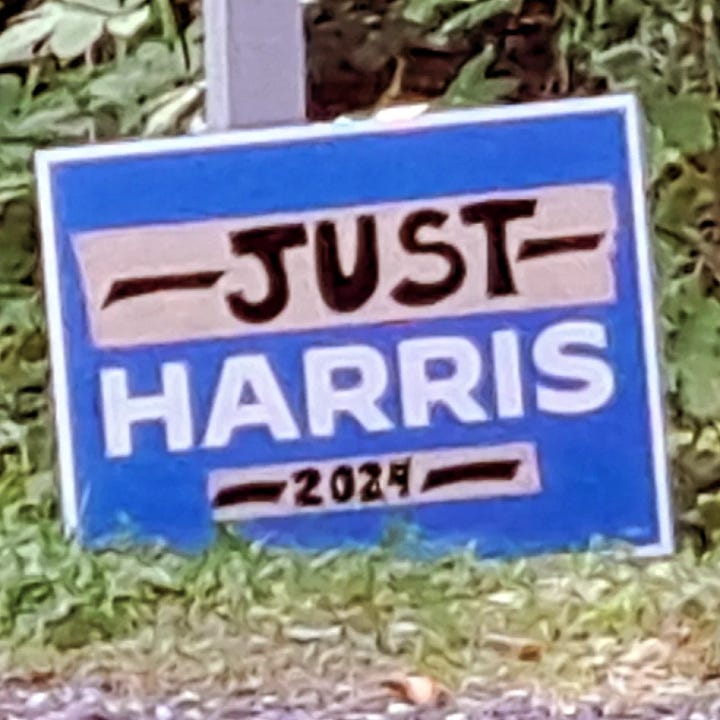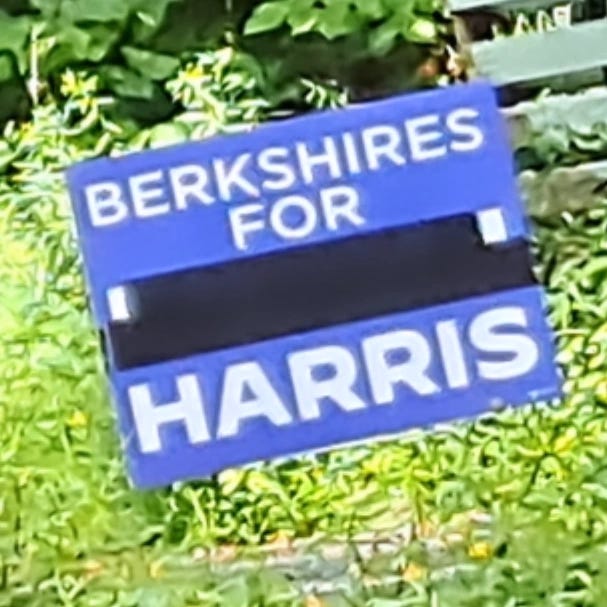FYI: This is another story tied to the US elections in November, but my focus here is third places in civic life anywhere. I’m delighted to have found an example to share with you. the audio version is here.
As I read about how important early coffeehouses - typical third places - were to early democratic organizing, I lament the way campaigning itself has become polarized: not about persuading people over to your side, but just talking to those who already agree with you.1 I’ve wondered if we wouldn’t be better off sending volunteers to go to diners and bars to hang out with people on the other side - in my case, with people who hear “Massachusetts” and think Blue State2 woke-hippy-communist.
From the article Ray Oldenburg and I contributed to the UNESCO Courier:
Coffee was considered dangerous when it was first introduced in Europe as coffee houses became the preferred location for political debate. In 1650, an entrepreneur remembered only as Jacob opened the first coffeehouse in Oxford. Shortly thereafter, others were opened in Cambridge and London. The coffeehouse and its “bitter, black beverage” were initially regarded as a novelty – but not for long. The democratic atmosphere of the coffee house, its equally democratic prices, and the pleasant contrast it offered to the drunkenness that plagued the inns and taverns of the 17th century brought it quick popularity.
When King Charles II tried to suppress the coffee houses in 1675, there was such a mighty public outcry that he retracted the edict ten days after. As places of free speech allowing a certain level of equality, coffee houses can be seen as the precursors of democracy.
Ray also wrote taverns in American history:
Just as third places run counter to the type of political control exercised in totalitarian societies, so they are essential to the political processes of a democracy. There can be no better example of this than offered by our own dear land for, as much as the mere idea may upbraid the sensitivities of some, our democracy had its origins in the local taverns of the revolutionary era. More than anywhere else in colonial America, the taverns offered a democratic forum. There, protest gelled into action and the organization of the revolution and of the society to follow were agreed upon. Within them, as the historians Carl and Jesse Bridenbaugh put it, "there existed that full and free interplay of spontaneous and responsible group association which appears to be a necessary condition of a healthy social order."
Admittedly, politicians today go to diners and fast food places, and to bars now and then because having a beer shows you’re a ordinary guy. (I’m not sure what the rules are for women. Hillary Clinton did lift a mug of beer in Wisconsin in 2016.) But Beto O’Rourke is the first politician I’ve come across who understands that bars, along with cafes and diners and barbershops, are the best places to connect with people who aren’t just like you.
I was just going to stay on the road, meet people in these bars and cafes, in the barbershops, and just really understand their stories, what connected with
them most, and then reflect that back on the campaign. . . . I want to be where the people are, the folks that I need to be listening to, these young voters who are going to decide the outcome of this election and then be doing the work that makes me feel good and fulfilled, registering them, staying in touch with them and turning them out. Those lines come from the transcript of a podcast from The Bulwark, a media venture I’m glad to help support, strange as it feels to be reading former Republican who are all in on Kamala Harris. This episode was primarily about Texas politics and O’Rourke’s career and experience and only briefly about the rising star, Jasmine Crockett.
When I heard O’Rourke refer to bars, cafes, and barbershops,3 I wondered if he has read The Great Good Place - the original book’s subtitle is Cafes, Coffee Shops, Bookstores, Bars, Hair Salons, and Other Hangouts at the Heart of a Community.
And after listening to the podcast, I was so impressed that I started reading about him. And I went to his 2019 blog, mentioned in the show. He was on the road and feeling lonely. He called his wife, but she was busy with the kids.
Maybe you could meet people at a bar she said as we hung up.
I pulled into the bar next to the hotel and started to feel self conscious. They aren’t going to want some stranger from out of town at their place. I walked in and took a seat at the bar, said a quick, probably nervous, hello to everyone and ordered a beer. Pro forma acknowledgement from the three or four guys who were already there.
I focused on the college basketball game, thinking I’ll finish this beer and then get out of here. I told myself at least I tried.
And then two seats down to my right the guy says do people ever tell you that you look like Beto O’Rourke?
I said yes, all the time.
The guy next to him says who the hell is Beto O’Rourke?
First guy says oh he ran against Ted Cruz in Texas, and goes on to talk about Beto O’Rourke and I’m worried that it’s going to get weird and so I say sorry I meant to say that I am Beto O’Rourke.
No shit! Laughter.
And the guy to my left says oh I wish my uncle was here, he’s one of the four Democrats in Ulysses.
That was in 2019. He’d served as a congressman for 6 years before that. Later in 2019, he entered the presidential race, dropped out and endorsed Joe Biden, and then ran for Texas governor and lost. It’s a tough job, being a Democratic politician in Red Texas.
I’ve been hearing more and more about young people’s longing for connection, community, and authenticity. Someone like Beto O’Rourke, with his unlikely name, authentic voice, and sheer doggedness, may be just what we need: not only to get new voters registered but making a new generation more likely to see politics as a meaningful, ethical ambition.
There are so many things wrong with the US electoral system that people elsewhere must have a hard time making any sense of it. I turned to the article “US Political System as a Model” in Global Perspectives on the United States (2007) and learned that the federal system in Europe developed along lines closer to the German model than the US - a good choice, it seems to me. And I read:
Glamorous and colorful, often identified with Hollywood images and high-sounding, emotive rhetoric, the U.S. political style is frequently lampooned overseas; its grandiose language and idealistic tone often ring hollow in European ears and sometimes sounds silly and simplistic when contrasted with the more hard-handed, pragmatic language of European politics. Nevertheless, the style of U.S. politics has considerable appeal to many non-U.S. politicians. The Americanization of British politics offers an especially good example. Britain has a parliamentary system that is quite unlike the U.S. system in many respects. Tony Blair, Britain’s prime minister, not only invested a great deal of political capital in his relationship with U.S. presidents Bill Clinton and George W. Bush, but has also attempted to appear “presidential” along U.S. lines. In spite of a large parliamentary majority after his landside victory of 1997, which removed the Conservative Party from power after eighteen years in office, “President” Blair often appeared to govern as if he were living in a system of separated powers, failing to use his large majority in Parliament to make radical changes to policy (something the U.S. system often makes difficult but the British system makes reasonably easy when the governing party has won by a substantial margin).
Tony Blair has also introduced a number of changes to his own system of governing that appear to move him toward presidential government and away from the traditions of parliamentary government. For instance, he has displayed a predilection for announcing policy changes in press conferences (much as a U.S. president or his subordinates would) rather than on the floor of the House of Commons (as has conventionally been done in the United Kingdom’s parliamentary system); he has reduced the number of question times the prime minister holds in the Commons, a move that originally created a storm of protest; and he has often seemed to distance himself from his own party, in a strategy that reminds Americans of Clinton’s triangulation strategy, building a personal coalition that appears to place him not inside his own Labour Party but between the two main parties. This approach frequently pits him against his own party. Blair has even suggested that the main candidates for office engage in debates prior general elections, something that has never been done in Britain but that is common in U.S. politics.
If only we could bring our system of government into the 21st century! But Americans cling to old ways as security: we still haven’t switched to the metric system.4
Two months till Election Day!


The Red State Blue State designation is relatively new, and contrary to the colors used almost everywhere else. You’ll have noticed that the MAGA people are all in red, obviously not making the association with Red China and the Communist Party. It was apparently the television media in 2000 that slapped the wrong colors on the election map.
Barbershops are more important than I realized, especially in Black communities. And presumably in Texas, too. Here’s a recent story from western Massachusetts: “An appreciation of Black barbershops takes place in Springfield.”
I notice that the hardware store now stocks tools and screws in both imperial (yes, that’s what the system we use in the US is called) and metric. I think of the young clerk in a London shop who looked at me pityingly as he said, “You still use inches, don’t you?”






